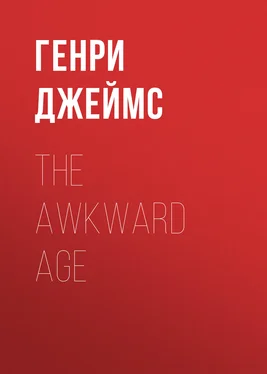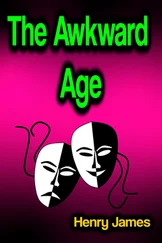Генри Джеймс - The Awkward Age
Здесь есть возможность читать онлайн «Генри Джеймс - The Awkward Age» — ознакомительный отрывок электронной книги совершенно бесплатно, а после прочтения отрывка купить полную версию. В некоторых случаях можно слушать аудио, скачать через торрент в формате fb2 и присутствует краткое содержание. Жанр: foreign_prose, foreign_antique, на английском языке. Описание произведения, (предисловие) а так же отзывы посетителей доступны на портале библиотеки ЛибКат.
- Название:The Awkward Age
- Автор:
- Жанр:
- Год:неизвестен
- ISBN:нет данных
- Рейтинг книги:5 / 5. Голосов: 1
-
Избранное:Добавить в избранное
- Отзывы:
-
Ваша оценка:
- 100
- 1
- 2
- 3
- 4
- 5
The Awkward Age: краткое содержание, описание и аннотация
Предлагаем к чтению аннотацию, описание, краткое содержание или предисловие (зависит от того, что написал сам автор книги «The Awkward Age»). Если вы не нашли необходимую информацию о книге — напишите в комментариях, мы постараемся отыскать её.
The Awkward Age — читать онлайн ознакомительный отрывок
Ниже представлен текст книги, разбитый по страницам. Система сохранения места последней прочитанной страницы, позволяет с удобством читать онлайн бесплатно книгу «The Awkward Age», без необходимости каждый раз заново искать на чём Вы остановились. Поставьте закладку, и сможете в любой момент перейти на страницу, на которой закончили чтение.
Интервал:
Закладка:
“And where’s the child this time?” he asked of his hostess as soon as he was seated near her.
“Why do you say ‘this time’ as if it were different from any other time?” she replied as she gave him his tea.
“Only because, as the months and the years elapse, it’s more and more of a wonder, whenever I don’t see her, to think what she does with herself—or what you do with her. What it does show, I suppose,” Mr. Mitchett went on, “is that she takes no trouble to meet me.”
“My dear Mitchy,” said Mrs. Brookenham, “what do YOU know about ‘trouble’—either poor Nanda’s or mine or anybody’s else? You’ve never had to take any in your life, you’re the spoiled child of fortune and you skim over the surface of things in a way that seems often to represent you as supposing everybody else has wings. Most other people are sticking fast in their native mud.”
“Mud, Mrs. Brook—mud, mud!” he protestingly cried as, while he watched his fellow visitor move to a distance with their host, he glanced about the room, taking in afresh the Louis Seize secretary which looked better closed than open and for which he always had a knowing eye. “Remarkably charming—mud!”
“Well, that’s what a great deal of the element really appears to-day to be thought; and precisely as a specimen, Mitchy dear, those two French books you were so good as to send me and which—really this time, you extraordinary man!” She fell back, intimately reproachful, from the effect produced on her, renouncing all expression save that of the rolled eye.
“Why, were they particularly dreadful?”—Mitchy was honestly surprised. “I rather liked the one in the pink cover—what’s the confounded thing called?—I thought it had a sort of a something-or-other.” He had cast his eye about as if for a glimpse of the forgotten title, and she caught the question as he vaguely and good-humouredly dropped it.
“A kind of a morbid modernity? There IS that,” she dimly conceded.
“Is that what they call it? Awfully good name. You must have got it from old Van!” he gaily declared.
“I dare say I did. I get the good things from him and the bad ones from you. But you’re not to suppose,” Mrs. Brookenham went on, “that I’ve discussed your horrible book with him.”
“Come, I say!” Mr. Mitchett protested; “I’ve seen you with books from Vanderbank which if you HAVE discussed them with him—well,” he laughed, “I should like to have been there!”
“You haven’t seen me with anything like yours—no, no, never, never!” She was particularly positive. “Van on the contrary gives tremendous warnings, makes apologies, in advance, for things that—well, after all, haven’t killed one.”
“That have even perhaps a little, after the warnings, let one down?”
She took no notice of this coarse pleasantry, she simply adhered to her thesis. “One has taken one’s dose and one isn’t such a fool as to be deaf to some fresh true note if it happens to turn up. But for abject horrid unredeemed vileness from beginning to end—”
“So you read to the end?” Mr. Mitchett interposed.
“I read to see what you could possibly have sent such things to me for, and because so long as they were in my hands they were not in the hands of others. Please to remember in future that the children are all over the place and that Harold and Nanda have their nose in everything.”
“I promise to remember,” Mr. Mitchett returned, “as soon as you make old Van do the same.”
“I do make old Van—I pull old Van up much oftener than I succeed in pulling you. I must say,” Mrs. Brookenham went on, “you’re all getting to require among you in general an amount of what one may call editing!” She gave one of her droll universal sighs. “I’ve got your books at any rate locked up and I wish you’d send for them quickly again; one’s too nervous about anything happening and their being perhaps found among one’s relics. Charming literary remains!” she laughed.
The friendly Mitchy was also much amused. “By Jove, the most awful things ARE found! Have you heard about old Randage and what his executors have just come across? The most abominable—”
“I haven’t heard,” she broke in, “and I don’t want to; but you give me a shudder and I beg you’ll have your offerings removed, since I can’t think of confiding them for the purpose to any one in this house. I might burn them up in the dead of night, but even then I should be fearfully nervous.”
“I’ll send then my usual messenger,” said Mitchy, “a person I keep for such jobs, thoroughly seasoned, as you may imagine, and of a discretion—what do you call it?—a toute epreuve. Only you must let me say that I like your terror about Harold! Do you think he spends his time over Dr. Watts’s hymns?”
Mrs. Brookenham just hesitated, and nothing, in general, was so becoming to her as the act of hesitation. “Dear Mitchy, do you know I want awfully to talk to you about Harold?”
“About his French reading, Mrs. Brook?” Mitchy responded with interest. “The worse things are, let me just mention to you about that, the better they seem positively to be for one’s feeling up in the language. They’re more difficult, the bad ones—and there’s a lot in that. All the young men know it—those who are going up for exams.”
She had her eyes for a little on Lord Petherton and her husband; then as if she had not heard what her interlocutor had just said she overcame her last scruple. “Dear Mitchy, has he had money from you?”
He stared with his good goggle eyes—he laughed out. “Why on earth—? But do you suppose I’d tell you if he had?”
“He hasn’t really borrowed the most dreadful sums?”
Mitchy was highly diverted. “Why should he? For what, please?”
“That’s just it—for what? What does he do with it all? What in the world becomes of it?”
“Well,” Mitchy suggested, “he’s saving up to start a business. Harold’s irreproachable—hasn’t a vice. Who knows in these days what may happen? He sees further than any young man I know. Do let him save.”
She looked far away with her sweet world-weariness. “If you weren’t an angel it would be a horror to be talking to you. But I insist on knowing.” She insisted now with her absurdly pathetic eyes on him. “What kind of sums?”
“You shall never, never find out—not if you were never to speak to me again,” Mr. Mitchett replied with extravagant firmness. “Harold’s one of my great amusements—I really have awfully few; and if you deprive me of him you’ll be a fiend. There are only one or two things I want to live for, but one of them is to see how far Harold will go. Please give me some more tea.”
“Do you positively swear?” she asked with intensity as she helped him. Then without waiting for his answer: “You have the common charity to US, I suppose, to see the position you’d put us in. Fancy Edward!” she quite austerely threw off.
Mr. Mitchett, at this, had on his side a wonder. “Does Edward imagine—?”
“My dear man, Edward never ‘imagined’ anything in life.” She still had her eyes on him. “Therefore if he SEES a thing, don’t you know? it must exist.”
Mitchy for a little fixed the person mentioned as he sat with his other guest, but whatever this person saw he failed just then to see his wife’s companion, whose eyes he never met. His face only offered itself after the fashion of a clean domestic vessel, a receptacle with the peculiar property of constantly serving yet never filling, to Lord Petherton’s talkative splash. “Well, only don’t let him take it up. Let it be only between you and me,” Mr. Mitchett pleaded; “keep him quiet—don’t let him speak to me.” He appeared to convey with his pleasant extravagance that Edward looked dangerous, and he went on with a rigour of levity: “It must be OUR little quarrel.”
Читать дальшеИнтервал:
Закладка:
Похожие книги на «The Awkward Age»
Представляем Вашему вниманию похожие книги на «The Awkward Age» списком для выбора. Мы отобрали схожую по названию и смыслу литературу в надежде предоставить читателям больше вариантов отыскать новые, интересные, ещё непрочитанные произведения.
Обсуждение, отзывы о книге «The Awkward Age» и просто собственные мнения читателей. Оставьте ваши комментарии, напишите, что Вы думаете о произведении, его смысле или главных героях. Укажите что конкретно понравилось, а что нет, и почему Вы так считаете.












